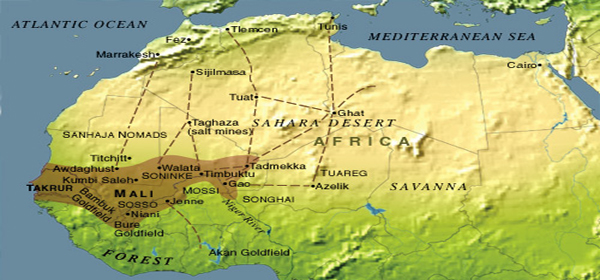- Washington “follows with interest” Morocco’s openness onto Africa (John Kerry)Posted 11 years ago
- The trial of South African Paralympic champion Oscar Pistorius opened in Pretoria on Monday.Posted 11 years ago
- USA welcomes efforts of King Mohammed VI in MaliPosted 11 years ago
- Egypt’s population reaches 94 millionPosted 11 years ago
- Mugabe celebrates his 90thPosted 11 years ago
- Moroccan Monarch to Build a Perinatal Clinic in BamakoPosted 11 years ago
- King Mohammed VI handed a donation of bovine semen for the benefit of Malian breeders.Posted 11 years ago
- Moroccan King’s strategic tour to Africa: Strengthening the will of pan African Solidarity and stimulating the south-south cooperation mechanisms over the continentPosted 12 years ago
- Senior al-Qaida leader killed in AlgeriaPosted 12 years ago
- Libya: The trial of former Prime Minister al-Baghdadi AliPosted 12 years ago
Mali: Gold mining, pollution and despoliation
 The growing liberalisation of world markets for gold resources in many developing countries was coveted by several multinationals. The Mali is no exception to this frenzy when its new mining code almost eliminated customs fees, duties and taxes to attract many multinational companies, mostly Canadian, American and South African in its territory. Unfortunately, the looting of the basement of Mali has dramatic consequences on the population and the environment. Pollution of streams with cyanide, mercury and lead, expropriation of the populace, increase of respiratory diseases, non-observance of fundamental human rights, child labour, all is included in the Malian dark picture of the wild gold mining in …
The growing liberalisation of world markets for gold resources in many developing countries was coveted by several multinationals. The Mali is no exception to this frenzy when its new mining code almost eliminated customs fees, duties and taxes to attract many multinational companies, mostly Canadian, American and South African in its territory. Unfortunately, the looting of the basement of Mali has dramatic consequences on the population and the environment. Pollution of streams with cyanide, mercury and lead, expropriation of the populace, increase of respiratory diseases, non-observance of fundamental human rights, child labour, all is included in the Malian dark picture of the wild gold mining in …
Despite the production record, Mali is ranked at the 178th place out of 182 countries, according to UNDP. The gold mining sector has very few benefits for the Malian economy. The yellow metal is over 75% of Mali’s total exports, but paradoxically it is only 8% of GDP. Similarly, royalties, profit taxes and dividends accounted for only 17% of total government revenue in 2008 despite the very high prices of gold. Furthermore, the impact of the mining sector on employment is extremely low Just 1% of the total labour force including both formal and informal employment is employed in this sector. The added value of gold mining remains very weak for several reasons. These include attractive regulation but with very little benefit to the economy, the state absence in regulating and controlling the mining companies’ activities, the drifting methods and the influence of the International mining corporations. Whatever they say, the highest authorities remain under the dome of the donors, forcing the government and neutralising its ability to defend the people’s interests. This duality was officially denounced by the General Directorate of Geology and Mining in 2004. Fifteen years after the gold mining boom in Mali, the population is still waiting for the benefits that still look distant. The mining sector’s contribution to Mali’s development is very low or even negative. The very functioning of the Malian gold sector has little effect on the rest of the economy. It is largely cut off from other economic sectors and completely export-oriented. Next to the cotton monoculture, Mali has developed a “monoculture of Gold”, another primary resource to be transformed and marketed abroad. What is at stake here is the economic development model implemented by successive governments under the influence of international financial institutions.
